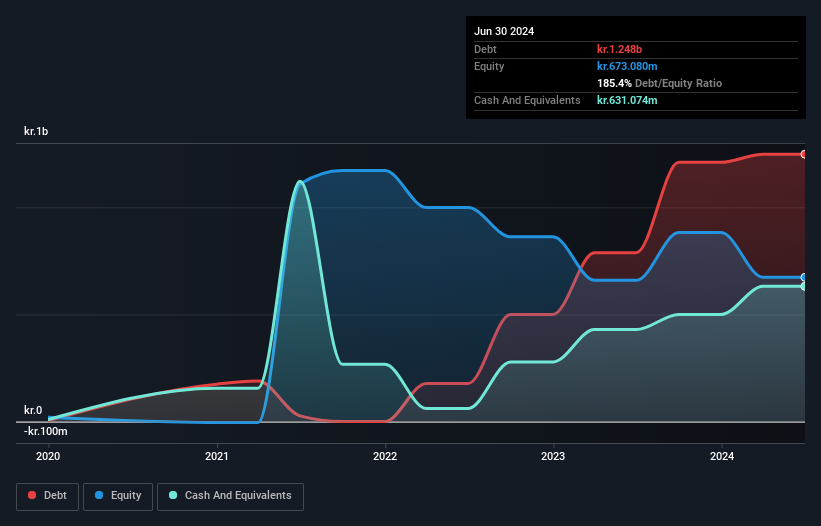
Some say volatility, rather than debt, is the best way to think about risk as an investor, but Warren Buffett famously said that 'Volatility is far from synonymous with risk.' When we think about how risky a company is, we always like to look at its use of debt, since debt overload can lead to ruin. We can see that Green Hydrogen Systems A/S (CPH:GREENH) does use debt in its business. But the real question is whether this debt is making the company risky.
Why Does Debt Bring Risk?
Generally speaking, debt only becomes a real problem when a company can't easily pay it off, either by raising capital or with its own cash flow. Ultimately, if the company can't fulfill its legal obligations to repay debt, shareholders could walk away with nothing. However, a more frequent (but still costly) occurrence is where a company must issue shares at bargain-basement prices, permanently diluting shareholders, just to shore up its balance sheet. Of course, plenty of companies use debt to fund growth, without any negative consequences. The first step when considering a company's debt levels is to consider its cash and debt together.
See our latest analysis for Green Hydrogen Systems
What Is Green Hydrogen Systems's Net Debt?
As you can see below, at the end of June 2024, Green Hydrogen Systems had kr.1.25b of debt, up from kr.788.3m a year ago. Click the image for more detail. However, it does have kr.631.1m in cash offsetting this, leading to net debt of about kr.616.7m.

How Healthy Is Green Hydrogen Systems' Balance Sheet?
According to the last reported balance sheet, Green Hydrogen Systems had liabilities of kr.1.13b due within 12 months, and liabilities of kr.402.3m due beyond 12 months. Offsetting this, it had kr.631.1m in cash and kr.67.7m in receivables that were due within 12 months. So its liabilities outweigh the sum of its cash and (near-term) receivables by kr.838.5m.
This deficit is considerable relative to its market capitalization of kr.1.20b, so it does suggest shareholders should keep an eye on Green Hydrogen Systems' use of debt. Should its lenders demand that it shore up the balance sheet, shareholders would likely face severe dilution. When analysing debt levels, the balance sheet is the obvious place to start. But it is future earnings, more than anything, that will determine Green Hydrogen Systems's ability to maintain a healthy balance sheet going forward. So if you want to see what the professionals think, you might find this free report on analyst profit forecasts to be interesting.
In the last year Green Hydrogen Systems wasn't profitable at an EBIT level, but managed to grow its revenue by 143%, to kr.60m. So there's no doubt that shareholders are cheering for growth
Caveat Emptor
Even though Green Hydrogen Systems managed to grow its top line quite deftly, the cold hard truth is that it is losing money on the EBIT line. Indeed, it lost a very considerable kr.394m at the EBIT level. Considering that alongside the liabilities mentioned above does not give us much confidence that company should be using so much debt. So we think its balance sheet is a little strained, though not beyond repair. However, it doesn't help that it burned through kr.575m of cash over the last year. So in short it's a really risky stock. There's no doubt that we learn most about debt from the balance sheet. However, not all investment risk resides within the balance sheet - far from it. To that end, you should learn about the 3 warning signs we've spotted with Green Hydrogen Systems (including 1 which is concerning) .
At the end of the day, it's often better to focus on companies that are free from net debt. You can access our special list of such companies (all with a track record of profit growth). It's free.
New: Manage All Your Stock Portfolios in One Place
We've created the ultimate portfolio companion for stock investors, and it's free.
• Connect an unlimited number of Portfolios and see your total in one currency
• Be alerted to new Warning Signs or Risks via email or mobile
• Track the Fair Value of your stocks
Have feedback on this article? Concerned about the content? Get in touch with us directly. Alternatively, email editorial-team (at) simplywallst.com.
This article by Simply Wall St is general in nature. We provide commentary based on historical data and analyst forecasts only using an unbiased methodology and our articles are not intended to be financial advice. It does not constitute a recommendation to buy or sell any stock, and does not take account of your objectives, or your financial situation. We aim to bring you long-term focused analysis driven by fundamental data. Note that our analysis may not factor in the latest price-sensitive company announcements or qualitative material. Simply Wall St has no position in any stocks mentioned.
About CPSE:GREENH
Green Hydrogen Systems
Develops and produces electrolysers for hydrogen production based on renewable energy in United Kingdom, Norway, Chile, and Switzerland.
Slight with limited growth.
Similar Companies
Market Insights
Community Narratives



